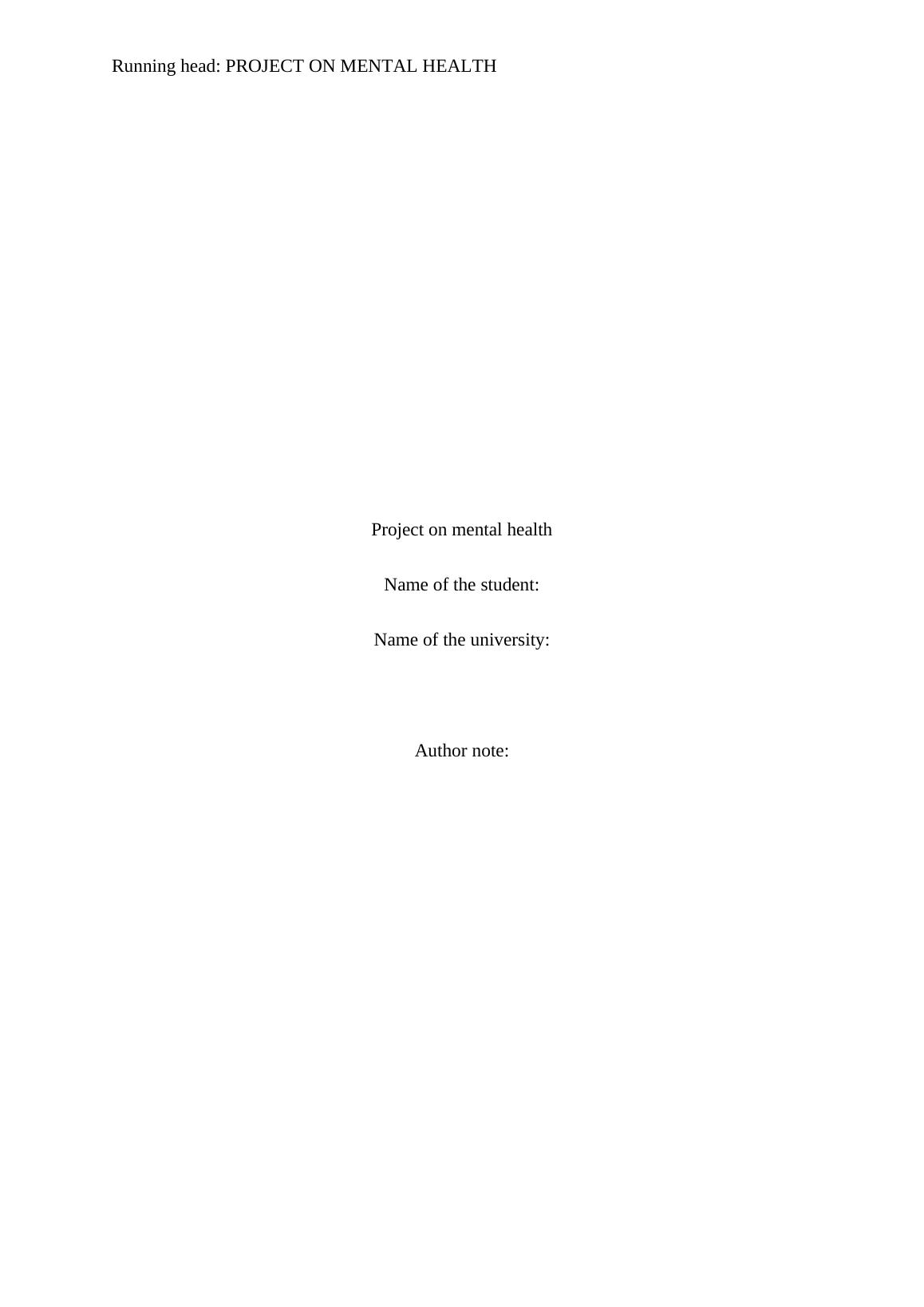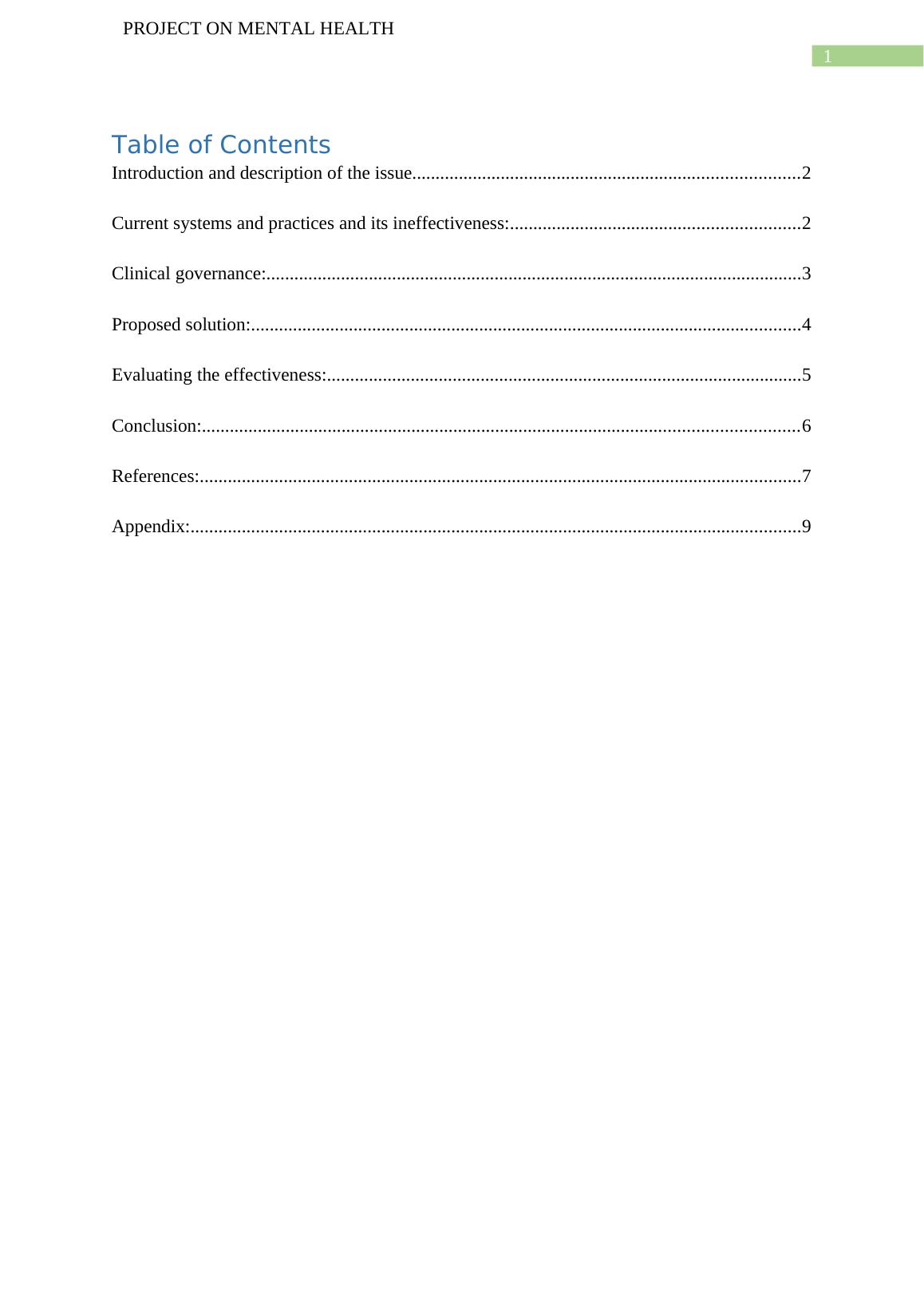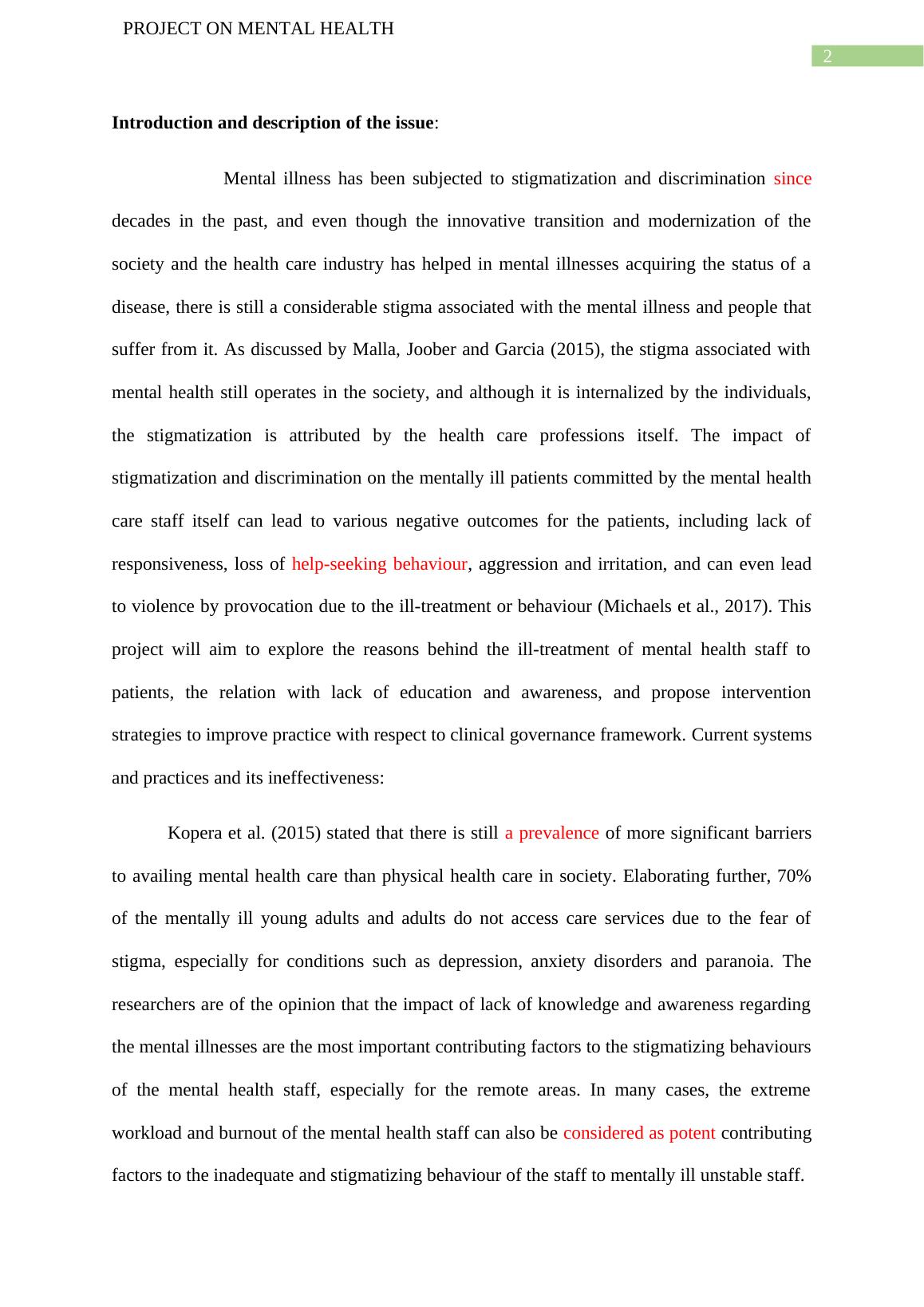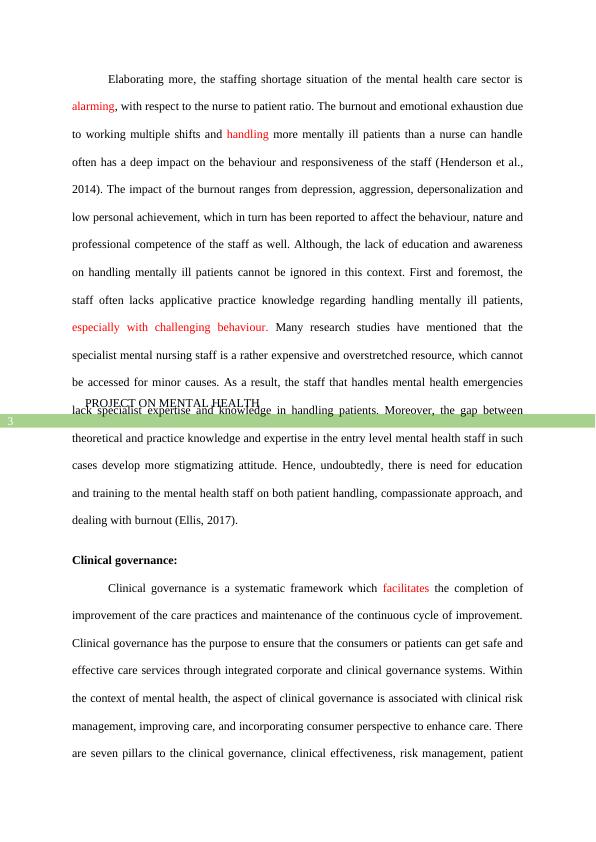NS5331 Effective Clinical Governance
11 Pages2500 Words40 Views
James Cook University Australia
Effective Clinical Governance (NS5331)
Added on 2021-10-13
NS5331 Effective Clinical Governance
James Cook University Australia
Effective Clinical Governance (NS5331)
Added on 2021-10-13
ShareRelated Documents
Running head: PROJECT ON MENTAL HEALTH
Project on mental health
Name of the student:
Name of the university:
Author note:
Project on mental health
Name of the student:
Name of the university:
Author note:

PROJECT ON MENTAL HEALTH
1
Table of Contents
Introduction and description of the issue...................................................................................2
Current systems and practices and its ineffectiveness:..............................................................2
Clinical governance:...................................................................................................................3
Proposed solution:......................................................................................................................4
Evaluating the effectiveness:......................................................................................................5
Conclusion:................................................................................................................................6
References:.................................................................................................................................7
Appendix:...................................................................................................................................9
1
Table of Contents
Introduction and description of the issue...................................................................................2
Current systems and practices and its ineffectiveness:..............................................................2
Clinical governance:...................................................................................................................3
Proposed solution:......................................................................................................................4
Evaluating the effectiveness:......................................................................................................5
Conclusion:................................................................................................................................6
References:.................................................................................................................................7
Appendix:...................................................................................................................................9

PROJECT ON MENTAL HEALTH
2
Introduction and description of the issue:
Mental illness has been subjected to stigmatization and discrimination since
decades in the past, and even though the innovative transition and modernization of the
society and the health care industry has helped in mental illnesses acquiring the status of a
disease, there is still a considerable stigma associated with the mental illness and people that
suffer from it. As discussed by Malla, Joober and Garcia (2015), the stigma associated with
mental health still operates in the society, and although it is internalized by the individuals,
the stigmatization is attributed by the health care professions itself. The impact of
stigmatization and discrimination on the mentally ill patients committed by the mental health
care staff itself can lead to various negative outcomes for the patients, including lack of
responsiveness, loss of help-seeking behaviour, aggression and irritation, and can even lead
to violence by provocation due to the ill-treatment or behaviour (Michaels et al., 2017). This
project will aim to explore the reasons behind the ill-treatment of mental health staff to
patients, the relation with lack of education and awareness, and propose intervention
strategies to improve practice with respect to clinical governance framework. Current systems
and practices and its ineffectiveness:
Kopera et al. (2015) stated that there is still a prevalence of more significant barriers
to availing mental health care than physical health care in society. Elaborating further, 70%
of the mentally ill young adults and adults do not access care services due to the fear of
stigma, especially for conditions such as depression, anxiety disorders and paranoia. The
researchers are of the opinion that the impact of lack of knowledge and awareness regarding
the mental illnesses are the most important contributing factors to the stigmatizing behaviours
of the mental health staff, especially for the remote areas. In many cases, the extreme
workload and burnout of the mental health staff can also be considered as potent contributing
factors to the inadequate and stigmatizing behaviour of the staff to mentally ill unstable staff.
2
Introduction and description of the issue:
Mental illness has been subjected to stigmatization and discrimination since
decades in the past, and even though the innovative transition and modernization of the
society and the health care industry has helped in mental illnesses acquiring the status of a
disease, there is still a considerable stigma associated with the mental illness and people that
suffer from it. As discussed by Malla, Joober and Garcia (2015), the stigma associated with
mental health still operates in the society, and although it is internalized by the individuals,
the stigmatization is attributed by the health care professions itself. The impact of
stigmatization and discrimination on the mentally ill patients committed by the mental health
care staff itself can lead to various negative outcomes for the patients, including lack of
responsiveness, loss of help-seeking behaviour, aggression and irritation, and can even lead
to violence by provocation due to the ill-treatment or behaviour (Michaels et al., 2017). This
project will aim to explore the reasons behind the ill-treatment of mental health staff to
patients, the relation with lack of education and awareness, and propose intervention
strategies to improve practice with respect to clinical governance framework. Current systems
and practices and its ineffectiveness:
Kopera et al. (2015) stated that there is still a prevalence of more significant barriers
to availing mental health care than physical health care in society. Elaborating further, 70%
of the mentally ill young adults and adults do not access care services due to the fear of
stigma, especially for conditions such as depression, anxiety disorders and paranoia. The
researchers are of the opinion that the impact of lack of knowledge and awareness regarding
the mental illnesses are the most important contributing factors to the stigmatizing behaviours
of the mental health staff, especially for the remote areas. In many cases, the extreme
workload and burnout of the mental health staff can also be considered as potent contributing
factors to the inadequate and stigmatizing behaviour of the staff to mentally ill unstable staff.

PROJECT ON MENTAL HEALTH
3
Elaborating more, the staffing shortage situation of the mental health care sector is
alarming, with respect to the nurse to patient ratio. The burnout and emotional exhaustion due
to working multiple shifts and handling more mentally ill patients than a nurse can handle
often has a deep impact on the behaviour and responsiveness of the staff (Henderson et al.,
2014). The impact of the burnout ranges from depression, aggression, depersonalization and
low personal achievement, which in turn has been reported to affect the behaviour, nature and
professional competence of the staff as well. Although, the lack of education and awareness
on handling mentally ill patients cannot be ignored in this context. First and foremost, the
staff often lacks applicative practice knowledge regarding handling mentally ill patients,
especially with challenging behaviour. Many research studies have mentioned that the
specialist mental nursing staff is a rather expensive and overstretched resource, which cannot
be accessed for minor causes. As a result, the staff that handles mental health emergencies
lack specialist expertise and knowledge in handling patients. Moreover, the gap between
theoretical and practice knowledge and expertise in the entry level mental health staff in such
cases develop more stigmatizing attitude. Hence, undoubtedly, there is need for education
and training to the mental health staff on both patient handling, compassionate approach, and
dealing with burnout (Ellis, 2017).
Clinical governance:
Clinical governance is a systematic framework which facilitates the completion of
improvement of the care practices and maintenance of the continuous cycle of improvement.
Clinical governance has the purpose to ensure that the consumers or patients can get safe and
effective care services through integrated corporate and clinical governance systems. Within
the context of mental health, the aspect of clinical governance is associated with clinical risk
management, improving care, and incorporating consumer perspective to enhance care. There
are seven pillars to the clinical governance, clinical effectiveness, risk management, patient
3
Elaborating more, the staffing shortage situation of the mental health care sector is
alarming, with respect to the nurse to patient ratio. The burnout and emotional exhaustion due
to working multiple shifts and handling more mentally ill patients than a nurse can handle
often has a deep impact on the behaviour and responsiveness of the staff (Henderson et al.,
2014). The impact of the burnout ranges from depression, aggression, depersonalization and
low personal achievement, which in turn has been reported to affect the behaviour, nature and
professional competence of the staff as well. Although, the lack of education and awareness
on handling mentally ill patients cannot be ignored in this context. First and foremost, the
staff often lacks applicative practice knowledge regarding handling mentally ill patients,
especially with challenging behaviour. Many research studies have mentioned that the
specialist mental nursing staff is a rather expensive and overstretched resource, which cannot
be accessed for minor causes. As a result, the staff that handles mental health emergencies
lack specialist expertise and knowledge in handling patients. Moreover, the gap between
theoretical and practice knowledge and expertise in the entry level mental health staff in such
cases develop more stigmatizing attitude. Hence, undoubtedly, there is need for education
and training to the mental health staff on both patient handling, compassionate approach, and
dealing with burnout (Ellis, 2017).
Clinical governance:
Clinical governance is a systematic framework which facilitates the completion of
improvement of the care practices and maintenance of the continuous cycle of improvement.
Clinical governance has the purpose to ensure that the consumers or patients can get safe and
effective care services through integrated corporate and clinical governance systems. Within
the context of mental health, the aspect of clinical governance is associated with clinical risk
management, improving care, and incorporating consumer perspective to enhance care. There
are seven pillars to the clinical governance, clinical effectiveness, risk management, patient

End of preview
Want to access all the pages? Upload your documents or become a member.
Related Documents
Stigma and mental illness Report 2022lg...
|9
|2225
|27
NS5331 Effective Clinical Governancelg...
|2
|584
|74
Prevalence and Impact of Stigma on Mental Healthlg...
|12
|2986
|80
REFLECTIVE ESSAY.lg...
|7
|1366
|361
Impact of Biogenetic Explanation on Mental Health Stigmalg...
|9
|2414
|85
Education about Mental Illnesslg...
|5
|901
|189
